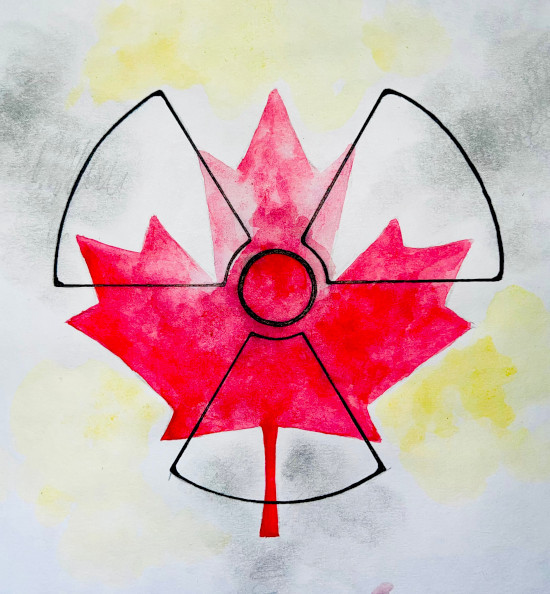Who’s afraid of nuclear power?
The future of energy is in our past

Illustration by Gabrielle Funk
In 2023, the German government announced that it had finalized the process of decommissioning its remaining nuclear reactors. The phase-out is the result of Energiewende, a decades-long strategy spear-headed by Die Grünen, Germany’s Green Party.
The decision saw overwhelming public support. According to a poll from 2019, nearly 60 per cent of Germans supported the movement to retire its reactors. There was widespread celebration of the result, particularly among climate activists such as Greenpeace.
Neighbouring France, on the other hand, is the world’s leader when it comes to nuclear power. In total, France boasts 56 reactors at 18 different sites and re- ceives close to 70 per cent of all its electricity from nuclear energy, more than any other country on the planet. France’s reactors produce so much energy that it exports its excess to Germany.
How could the country that birthed quantum mechanics become so skeptical of atomic energy? The anti-nuclear position in Germany has a complicated history resulting from anti-authoritarianism following the Second World War, Cold War tensions and the nuclear disasters of Chernobyl in 1986 and Fukushima in 2011.
For instance, Greenpeace’s website states “(we have) always fought – and will continue to fight – vigorously against nuclear power because it is an unacceptable risk to the environment and to humanity.”
Most concerns about nuclear power typically fall within two categories: safety and economics. On the issue of safety, critics point to spent nuclear fuel, the potential for meltdown and the dangers associated with uranium extraction to suggest that the costs of nuclear power are too high.
Yet, when looking at the data, nuclear energy emits less carbon dioxide per gigawatt of electricity produced than solar power. As for the issue of spent fuel, waste can be safely disposed of in concrete casks, provided proper practices are followed. New technology also allows for some spent fuel to be reused, although this isn’t currently in widespread practice.
On the economic side, critics argue that reactors are too costly to be worthwhile. While nuclear reactors have large upfront costs, one paper published in the journal Applied Energy suggests that, without nuclear power, the costs to meet global energy demand by 2060 would be up to 50 per cent higher.
Despite what the empirical data says about nuclear power, public opinion remains uncertain. According to Dr. Han- nah Ritchie, a researcher at the University of Oxford, less than half of people in the UK believe that nuclear power is a low-carbon energy source.
The unintended result of environmentalist groups, whose stated goal is to protect both the public and the environment, is that Germany has turned to coal plants to meet its energy needs.
That is to say, turning to an energy source that emits 273 times more carbon dioxide than nuclear power and resulting in up to 820 times the amount of deaths.
There is not a single materially prosperous country on the planet that has low energy consumption. What’s more, recent estimates suggest that global energy demand is expected to grow by a factor of one and a half by 2050.
If we are to simultaneously maintain our standard of living and reduce our emissions in the future, we must turn to the technology of the past: nuclear power.
Gabriel Louer̈ is a volunteer contributor for The Uniter. He serves as emerging leaders director for the UWSA.
Published in Volume 78, Number 21 of The Uniter (March 14, 2024)






